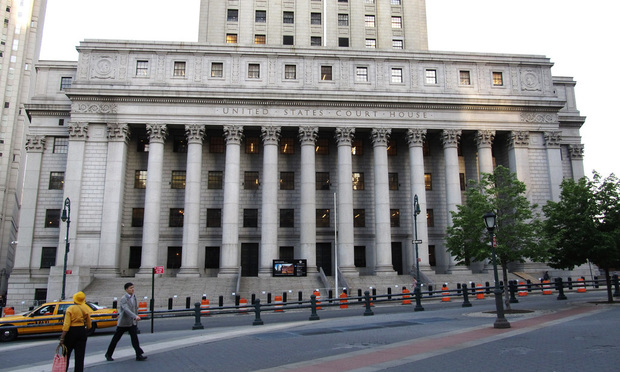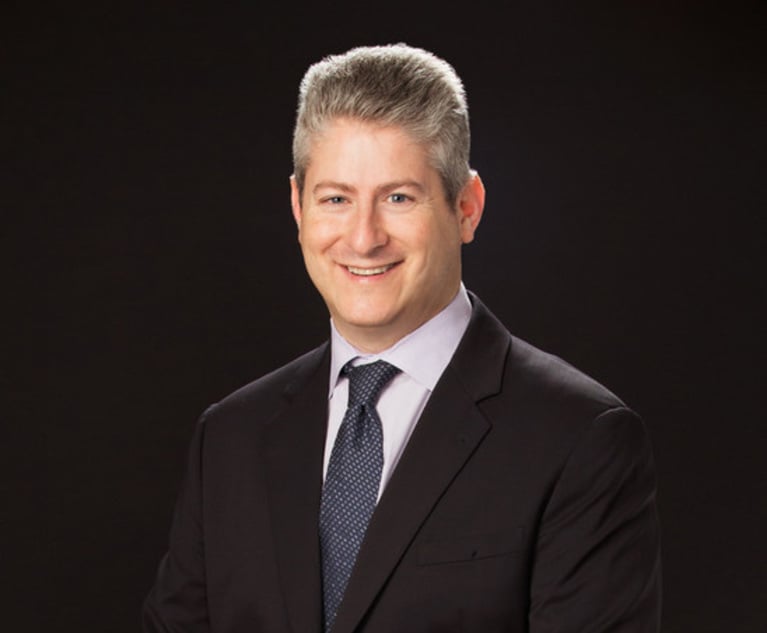Federal Courts Could Remain Open for Weeks During Shutdown
A spokesperson for the Administrative Office of the U.S. Courts said operating in a shutdown "would not be business as usual," but that fees and appropriations balances could fund the courts for about three weeks.
December 21, 2018 at 02:05 PM
2 minute read
The original version of this story was published on National Law Journal
 The U.S. Court of Appeals for the Second Circuit and the U.S. District Court for the Southern District of New York. (Photo: Ken Lund)
The U.S. Court of Appeals for the Second Circuit and the U.S. District Court for the Southern District of New York. (Photo: Ken Lund)
Federal courts could operate fully for at least three weeks in the event of a federal government shutdown.
Jordan Prince, special assistant to the district executive for the Southern District of New York, said in an email that the federal judiciary has sufficient funding to sustain operations through Jan. 11, 2019.
“If a continuing resolution is not passed by midnight tonight, December 21, 2018, and there is a federal government shutdown, the U.S. District Court for the Southern District of New York will NOT shut down,” Prince wrote.
Early Friday, the government seemed poised to shut down as Congress and President Donald Trump clashed over $5 billion in funding for Trump's proposed wall along the country's border with Mexico.
Jackie Koszczuk, a spokeswoman for the Administrative Office of the U.S. Courts, said operating in a shutdown “would not be business as usual,” but that fees and appropriations balances could fund the courts for about three weeks.
“We would look for ways to constrain operations and defer expenses, such as travel and training,” said Koszczuk, in an email statement. “In general, courts would be asked to defer expenses where possible in order to conserve funds that could be needed if the lapse in appropriations goes beyond the estimated three weeks we can fund. It's possible the guidance could change as circumstances require.”
In the most recent government shutdown, from Oct. 1 to Oct. 17, 2013, the federal judiciary remained open and operational until a deal was reached, funded through a combination of court fees and long-term appropriations. As that shutdown proceeded, however, individual district and circuit courts made contingency plans for what to do when those funds were exhausted. Individual courts would have had to make their own decisions about staffing needs and employee furloughs.
This content has been archived. It is available through our partners, LexisNexis® and Bloomberg Law.
To view this content, please continue to their sites.
Not a Lexis Subscriber?
Subscribe Now
Not a Bloomberg Law Subscriber?
Subscribe Now
NOT FOR REPRINT
© 2025 ALM Global, LLC, All Rights Reserved. Request academic re-use from www.copyright.com. All other uses, submit a request to [email protected]. For more information visit Asset & Logo Licensing.
You Might Like
View All

Cooley Promotes NY Office Leader to Global Litigation Department Chair

NY Judge Resigns After Avoiding Jury Duty by Telling Court He Couldn't Be Impartial

Charlie Javice Jury Will Not See Her Texts About Elizabeth Holmes
Trending Stories
- 1Haynes and Boone Expands in New York With 7-Lawyer Seward & Kissel Fund Finance, Securitization Team
- 2Upstart Insurer That's Wowing Industry Hires AIG Legal Exec to Help Guide Global Expansion
- 3Connecticut Lawyers in Spotlight for Repping FBI Agents
- 4SEC Sued for Failing to Reveal Records Involving Simpson Thacher Attorney
- 5Lawsuit Accuses University of California of Racial Discrimination in Admissions
Who Got The Work
J. Brugh Lower of Gibbons has entered an appearance for industrial equipment supplier Devco Corporation in a pending trademark infringement lawsuit. The suit, accusing the defendant of selling knock-off Graco products, was filed Dec. 18 in New Jersey District Court by Rivkin Radler on behalf of Graco Inc. and Graco Minnesota. The case, assigned to U.S. District Judge Zahid N. Quraishi, is 3:24-cv-11294, Graco Inc. et al v. Devco Corporation.
Who Got The Work
Rebecca Maller-Stein and Kent A. Yalowitz of Arnold & Porter Kaye Scholer have entered their appearances for Hanaco Venture Capital and its executives, Lior Prosor and David Frankel, in a pending securities lawsuit. The action, filed on Dec. 24 in New York Southern District Court by Zell, Aron & Co. on behalf of Goldeneye Advisors, accuses the defendants of negligently and fraudulently managing the plaintiff's $1 million investment. The case, assigned to U.S. District Judge Vernon S. Broderick, is 1:24-cv-09918, Goldeneye Advisors, LLC v. Hanaco Venture Capital, Ltd. et al.
Who Got The Work
Attorneys from A&O Shearman has stepped in as defense counsel for Toronto-Dominion Bank and other defendants in a pending securities class action. The suit, filed Dec. 11 in New York Southern District Court by Bleichmar Fonti & Auld, accuses the defendants of concealing the bank's 'pervasive' deficiencies in regards to its compliance with the Bank Secrecy Act and the quality of its anti-money laundering controls. The case, assigned to U.S. District Judge Arun Subramanian, is 1:24-cv-09445, Gonzalez v. The Toronto-Dominion Bank et al.
Who Got The Work
Crown Castle International, a Pennsylvania company providing shared communications infrastructure, has turned to Luke D. Wolf of Gordon Rees Scully Mansukhani to fend off a pending breach-of-contract lawsuit. The court action, filed Nov. 25 in Michigan Eastern District Court by Hooper Hathaway PC on behalf of The Town Residences LLC, accuses Crown Castle of failing to transfer approximately $30,000 in utility payments from T-Mobile in breach of a roof-top lease and assignment agreement. The case, assigned to U.S. District Judge Susan K. Declercq, is 2:24-cv-13131, The Town Residences LLC v. T-Mobile US, Inc. et al.
Who Got The Work
Wilfred P. Coronato and Daniel M. Schwartz of McCarter & English have stepped in as defense counsel to Electrolux Home Products Inc. in a pending product liability lawsuit. The court action, filed Nov. 26 in New York Eastern District Court by Poulos Lopiccolo PC and Nagel Rice LLP on behalf of David Stern, alleges that the defendant's refrigerators’ drawers and shelving repeatedly break and fall apart within months after purchase. The case, assigned to U.S. District Judge Joan M. Azrack, is 2:24-cv-08204, Stern v. Electrolux Home Products, Inc.
Featured Firms
Law Offices of Gary Martin Hays & Associates, P.C.
(470) 294-1674
Law Offices of Mark E. Salomone
(857) 444-6468
Smith & Hassler
(713) 739-1250






